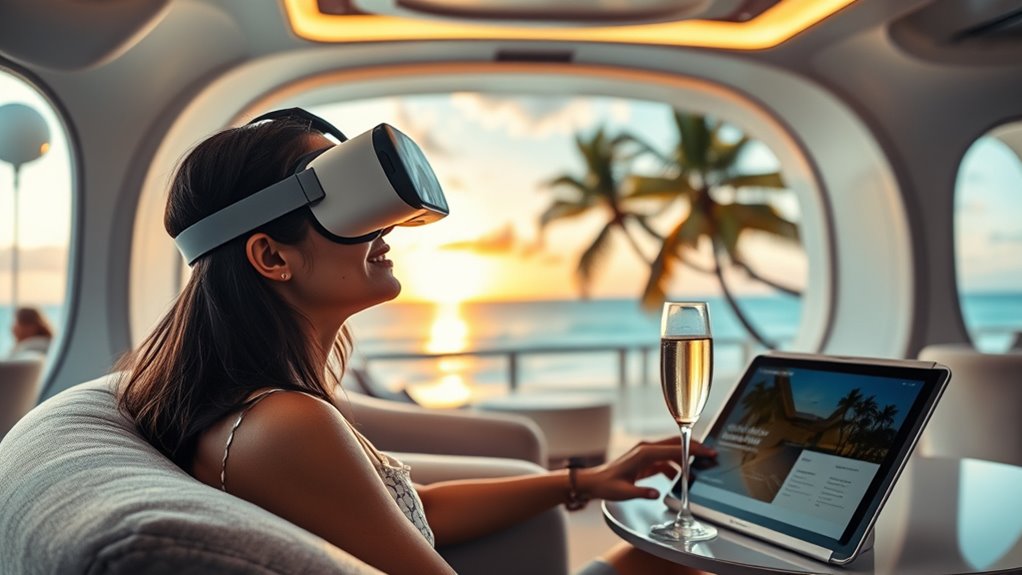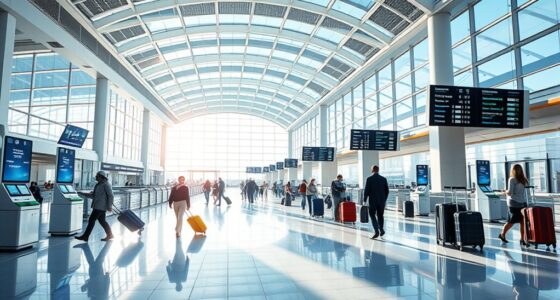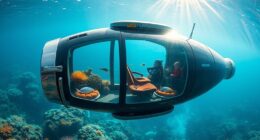Virtual reality is transforming luxury travel by offering you immersive experiences that enhance engagement and personalization. You can explore luxury properties through virtual tours, boosting your confidence in bookings with an engaging 360-degree view. With innovations like tailored VR wellness experiences, your travel planning becomes more enjoyable and less environmentally impactful. This technology is revolutionizing how you connect with destinations, and if you stick around, you’ll discover even more about its exciting future.
Key Takeaways
- VR enhances luxury travel by providing immersive virtual tours of high-end accommodations, increasing customer confidence in booking decisions.
- Personalized VR experiences, like Four Seasons’ multi-sensory wellness offerings, cater to individual relaxation preferences and enhance guest satisfaction.
- Virtual reality reduces the need for physical travel, promoting sustainability by cutting carbon emissions and alleviating over-tourism.
- AI-powered chatbots in conjunction with VR offer continuous customer support, enhancing the luxury travel planning experience with real-time assistance.
- Engaging 360-degree explorations through VR create emotional connections, making potential travelers more interested in luxury destinations and experiences.
Market Overview of Virtual Tourism
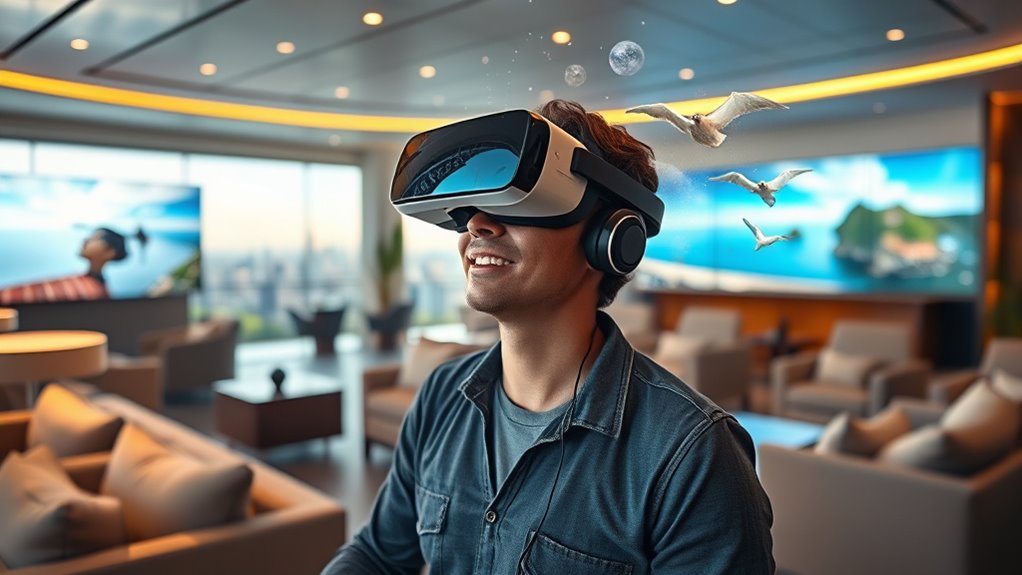
The virtual tourism market is rapidly evolving, offering exciting opportunities for both travelers and businesses. Valued at $12.38 billion in 2024, it’s projected to reach $14.63 billion in 2025, showcasing an 18.1% growth rate. Virtual tourism market is expected to expand to $28.14 billion by 2029 with a CAGR of 17.8%.
The global Virtual Reality in Travel Market is even more promising, expected to grow at a staggering CAGR of 33.4%. Key players like Google and Sony Interactive Entertainment are leading the charge, while travel agencies leverage VR to enhance customer engagement.
With advancements in 5G networks and AI, immersive experiences are becoming more accessible. Despite challenges like high initial costs, the surge in internet usage and mobile devices provides a solid foundation for future growth, which could see the market soar to $111.16 billion by 2033.
The Role of VR in Luxury Travel

Luxury travel is transforming with the integration of virtual reality (VR), offering an unprecedented level of engagement and personalization. You can now explore luxury properties through virtual tours, boosting your confidence in booking decisions.
Hotels are seeing online bookings soar by up to 135% thanks to these immersive experiences. Imagine virtually wandering through stunning suites or relaxing at world-class spas before you even arrive.
VR also lets you experience exclusive locations, like private villas or safari lodges, from anywhere. Innovations like the Four Seasons’ multi-sensory wellness VR experience tailor relaxation just for you.
Plus, with reduced pre-booking travel, VR helps minimize environmental impact, making your luxurious journey more sustainable and enjoyable.
Immersive Experiences and Trip Planning
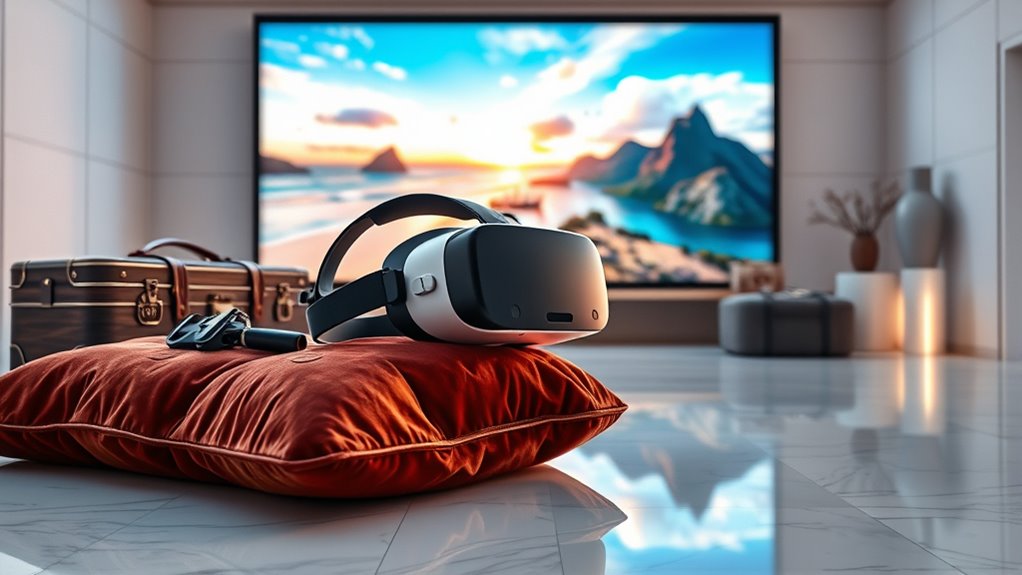
As travelers seek more engaging ways to plan their trips, immersive experiences through virtual reality (VR) are revolutionizing the process.
With VR, you can embark on virtual tours of destinations, exploring landmarks and natural wonders in stunning 360-degree detail. This enhanced engagement sparks your interest and enthusiasm for potential trips, while cultural immersion evokes strong emotions that leave lasting impressions.
You can make informed decisions about where to go by getting a comprehensive understanding of each destination. Plus, VR helps you craft personalized itineraries tailored to your preferences, boosting your confidence in travel plans.
Technological Innovations Shaping the Industry

While travelers enjoy exploring new destinations, technological innovations are reshaping the travel industry in remarkable ways. AI and VR are at the forefront, creating personalized experiences and simplifying booking processes.
You’ll find AI-powered chatbots offering continuous support and real-time translation, enhancing customer service like never before. With VR, you can virtually explore destinations and tour hotel rooms before booking, making informed choices easier.
This technology revolutionizes travel marketing, engaging you through immersive experiences that foster emotional connections to places. As luxury accommodations adopt VR for showcasing amenities, you’ll enjoy tailored recommendations and streamlined bookings. The rise of AI-driven platforms also plays a crucial role in catering to diverse travel preferences, further enhancing the overall experience.
The integration of these technologies not only enhances the travel experience but also democratizes luxury travel, making it accessible to a broader audience.
Environmental Benefits of Virtual Travel

Virtual travel not only offers an exciting way to explore the world, but it also provides significant environmental benefits that can’t be overlooked.
By reducing the need for flights, you can help decrease carbon emissions, which account for about 2-3% of global greenhouse gases. Virtual experiences can potentially cut emissions by up to 40% by 2030.
Moreover, you’ll help alleviate over-tourism, protecting fragile ecosystems and raising awareness about the impact of excessive visitors. This innovative approach also ensures cultural heritage sites remain intact, allowing you to explore these treasures without contributing to their degradation.
Ultimately, virtual travel serves as a sustainable alternative, making global destinations accessible while minimizing environmental harm. Additionally, it can provide an immersive experience that rivals real-life exploration, enhancing color accuracy for a more vivid visual representation of these locations.
Marketing Strategies Leveraging VR
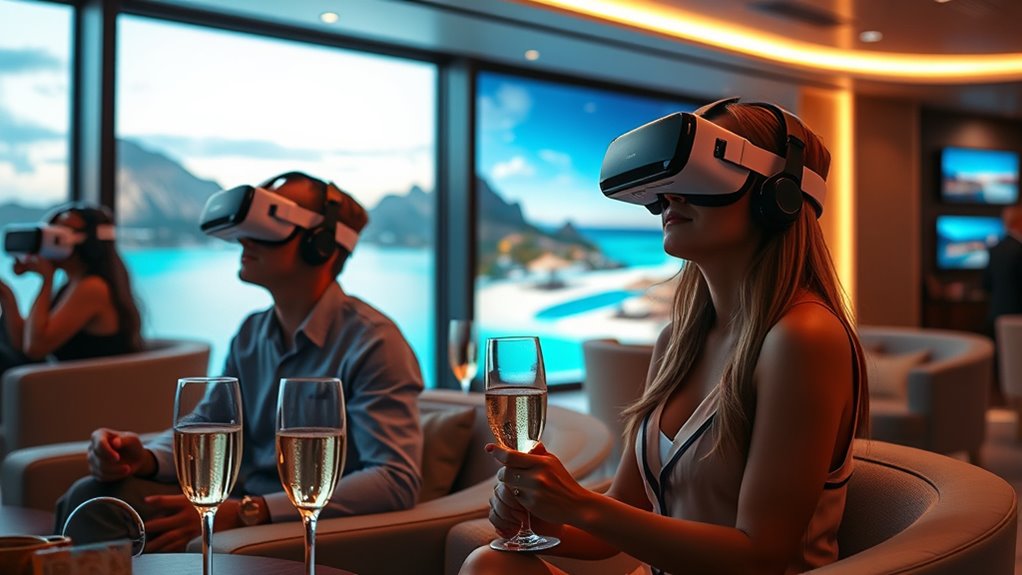
The rise of virtual travel has opened new avenues for marketing strategies within the travel industry. You can leverage VR to create immersive experiences that captivate potential travelers.
For instance, Thomas Cook’s “Try Before You Fly” campaign boosted New York excursion bookings by 190% through engaging VR content. Destination Marketing Organizations utilize VR to forge emotional connections, encouraging bookings through memorable virtual tours.
Companies like Ascape provide VR content to enhance destination marketing efforts. By showcasing hotels and attractions in 360 degrees, you can increase engagement and inspire wanderlust.
The early adoption of VR sets you apart from competitors, creating shareable experiences that boost brand awareness and drive sales. With VR, you can transform how you connect with travelers.
Future Trends in Luxury Travel and VR
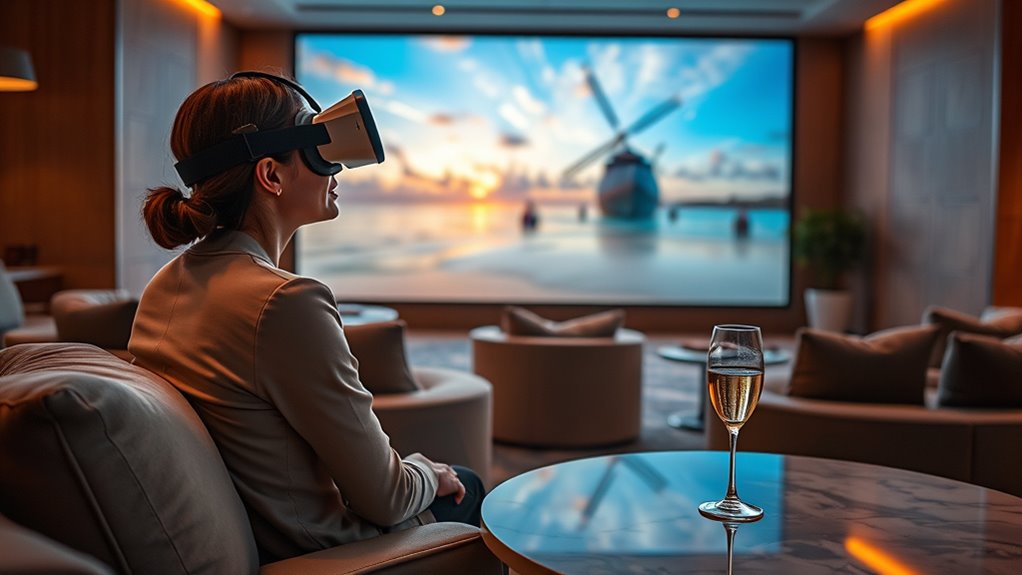
As technology advances, luxury travel is set to undergo a transformation that blends immersive experiences with personalized service.
You’ll soon find VR allowing you to explore destinations and accommodations before booking, making informed decisions easier than ever. AI will curate personalized itineraries tailored to your preferences, while enhanced trip planning through virtual tours ensures you “try before you buy.”
Imagine immersing yourself in cultural experiences, like virtual cooking classes or historical site tours. With sustainability in mind, virtual explorations will minimize your carbon footprint.
Plus, emerging technologies like XR and wearable gadgets will elevate your experiences, making luxury travel more accessible and inclusive.
The future of luxury travel is exciting, and VR is at the forefront of this revolution.
Frequently Asked Questions
How Does VR Impact Customer Service in Luxury Travel?
VR significantly impacts customer service in luxury travel by enhancing your experience from the planning stage onward.
You can explore accommodations and destinations virtually, boosting your confidence in booking decisions. This immersive approach reduces anxiety, making it easier to tailor your itinerary to your preferences.
With engaging 360-degree tours, you feel more connected and informed, allowing you to make choices that perfectly match your expectations for a luxurious getaway.
What Are the Costs Associated With Implementing VR in Travel Businesses?
Implementing VR in travel businesses can feel like building a luxury mansion in the sky!
You’ll face various costs, including $20,000 to $100,000 for software development and $10,000 to $50,000 for high-quality 3D content.
Marketing can add another $5,000 to $30,000, while operational costs like VR headsets and internet setup may range from $3,000 to $10,000.
Don’t forget about ongoing maintenance and cybersecurity; they’re essential for a seamless experience!
Can VR Experiences Replace Actual Travel in the Future?
Can VR experiences replace actual travel in the future?
While VR offers immersive experiences that help you explore destinations, it can’t fully replicate the unique sensations of physical travel.
You’ll miss out on real-world interactions, cultural immersion, and the emotional connections that come from being in a place.
Although VR can enhance your planning and reduce travel anxiety, the essence of travel—those unforgettable moments—remains irreplaceable in the realm of virtual experiences.
How Do Users Access VR Travel Experiences?
To tap into terrific travel experiences, you can choose cutting-edge VR headsets or smart smartphones.
Settle into simulation systems like PCs or consoles for stunning scenery. Seek specialized software for sensational 360-degree views and immersive interaction.
With wearable technology, you’ll enjoy heightened sensory sensations.
Virtual tours let you wander whimsical landmarks and culturally rich sites, while adventure simulations offer thrilling escapes—all from the comfort of your own cozy corner.
Are There Privacy Concerns With Using VR in Travel?
Yes, there are significant privacy concerns when you use VR technology.
It collects extensive sensory and biometric data, including your movements and preferences. This data can often be re-identified, even if it’s supposedly de-identified.
Your location and behavior are tracked, which raises the risk of exposing your personal identity. Additionally, if this information is combined with other data, it can create a detailed profile of you, making anonymity difficult.
Conclusion
In conclusion, virtual reality is revolutionizing luxury travel, making it feel like you’re stepping into a dream world. You can explore exotic destinations and enjoy immersive experiences without leaving your home. As technology continues to advance, the possibilities for enhancing your travel adventures are limitless. Embracing VR not only enriches your trip planning but also offers a sustainable alternative, so you can travel the globe while keeping our planet as healthy as ever.
